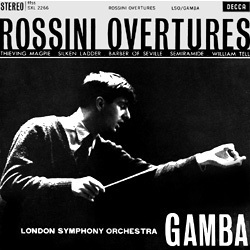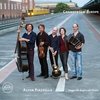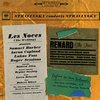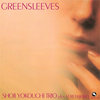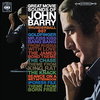SORRY - SOLD OUT
AAA 100% Analogue This LP was Remastered using Pure Analogue Components Only from the Master Tapes through to the Cutting Head
Speakers Corner / Decca - 180 Gram Virgin Vinyl - AAA 100% Analogue
Lacquers cut by Tony Hawkins - Limited Edition - Decca SXL 2266
Pure Analogue Audiophile Mastering - Pressed at Pallas Germany
Speakers Corner 25 Years pure Analogue
The Absolute Sound Super Disc List TAS Harry Pearson Super LP List
Supreme LP Recordings - Hiend Audio
The performances are taut and exciting and the orchestra playing splendidly alive and polished, even at the very fast speeds sometimes chosen for the allegros. A strong disciplining force - not unlike Toscanini's style - is felt in every piece, and care in phrasing is noticeable at every turn. Particularly captivating is the string cantilena at the introduction of The Barber Of Seville, which is phrased with a wonderful sense of line. Decca's recording is quite superlative. - LP Magazine Review
This re-issue is of one of Decca's most respected recordings. It is on the TAS Super Disk list in the original pressing. It is a highly sought after LP.
Rossini: Opera Overtures from “The Thieving Magpie”, “The Silken Ladder”, “The Barber of Seville”, “Semiramide”, “William Tell” - London Symphony Orchestra conducted by Pierino Gamba
Indeed deliver on its claims of enhanced sound quality and clarity, making each and every instrument in the LSO completely audible and crisp. This recording clarity coupled with the fiery direction of conductor Piero Gamba yields Rossini overtures performed with a level of conviction and enthusiasm not frequently encountered. As these works are performed and recorded so frequently, it is too often the case that orchestras are simply going through the motions of playing the notes. Gamba and the LSO emphasize dynamic nuance, shifting textures, and decisive articulation to produce an exciting musical experience even to listeners who may have heard these pieces thousands of times before. Audio Review
This special collection of operatic music composed by Gioachino Rossini contains five of his most famous works including "The Barber of Seville," one of the most famous pieces of operatic music. The "Rossini Overtures," performed here by the London Symphony Orchestra and conducted by Pierino Gamba, are a true delight to any connoisseur of classical music. This important work also includes "The Thieving Magpie," "The Silken Ladder" and "William Tell," the last opera Rossini ever wrote. this title will dazzle you with a spectrum of musical energy.
Although Gioacchino Rossini wrote 39 operas, they are rarely heard today – with the exception of The Barber of Seville. Many of his overtures have, however, remained extremely popular. This record presents five of them which were composed between 1812 and 1829. Rossini’s orchestral works are famous for the magic of the almost inevitable “Rossini crescendo”. The composer is said to have been so disheartened by the failure of his last opera William Tell that he gave up composing, and took his talents into the kitchen. He was an excellent cook and one can well imagine how the rich melodic inspiration of his overtures was transferred to his menus.
Pierro Gamba’s masterly interpretations convey the structure of the compositions, while the London Symphony Orchestra certainly sets off the fireworks. The sound quality has lost nothing of its brilliance and musically the recordings are of a very high standard, clear and animated.
November 1960 Town Hall, Walthamstow with Kenneth E. Wilkinson / Production: Ray Minshull
Musicians:
Pierino Gamba, conductor
London Symphony Orchestra
Selections:
Rossini (1792 - 1868)
Opera Overatures
1. The Thieving Magpie
2. The Silken Ladder
3. The Barber of Seville
4. Semiramide
5. William Tell
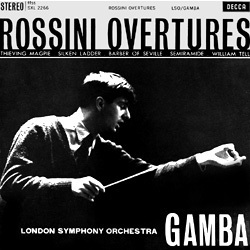
25 Years pure Analogue
Are your records completely analogue?
Yes! This we guarantee!
As a matter of principle, only analogue masters are used, and the necessary cutting delay is also analogue. All our cutting engineers use only Neumann cutting consoles, and these too are analogue. The only exception is where a recording has been made – either partly or entirely – using digital technology, but we do not have such items in our catalogue at the present time
Are your records cut from the original masters?
In our re-releases it is our aim to faithfully reproduce the original intentions of the musicians and recording engineers which, however, could not be realised at the time due to technical limitations. Faithfulness to the original is our top priority, not the interpretation of the original: there is no such thing as a “Speakers Corner Sound”. Naturally, the best results are obtained when the original master is used. Therefore we always try to locate these and use them for cutting. Should this not be possible, – because the original tape is defective or has disappeared, for example – we do accept a first-generation copy. But this remains an absolute exception for us.
Who cuts the records?
In order to obtain the most faithful reproduction of the original, we have the lacquers cut on the spot, by engineers who, on the whole, have been dealing with such tapes for many years. Some are even cut by the very same engineer who cut the original lacquers of the first release. Over the years the following engineers have been and still are working for us: Tony Hawkins, Willem Makkee, Kevin Gray, Maarten de Boer, Scott Hull, and Ray Staff, to name but a few.
At the beginning of the ‘90s, in the early days of audiophile vinyl re-releases, the reissue policy was fairly straightforward. Companies such as DCC Compact Classics, Mobile Fidelity, Classic Records and others, including of course Speakers Corner, all maintained a mutual, unwritten code of ethics: we would manufacture records sourced only from analogue tapes.
Vinyl’s newfound popularity has led many other companies to jump on the bandwagon in the hope of securing a corner of the market. Very often they are not so ethical and use every imaginable source from which to master: CDs, LPs, digital files and even MP3s.
Even some who do use an analogue tape source employ a digital delay line, a misguided ’80s and ‘90s digital technology that replaces the analogue preview head originally used to “tell” the cutter head in advance what was about to happen musically, so it could adjust the groove “pitch” (the distance between the grooves) to make room for wide dynamic swings and large low frequency excursions. Over time analogue preview heads became more rare and thus expensive.
So while the low bit rate (less resolution than a 16 bit CD) digital delay line is less expensive and easier to use than an analogue “preview head”, its use, ironically, results in lacquers cut from the low bit rate digital signal instead of from the analogue source!
Speakers Corner wishes to make clear that it produces lacquers using only original master tapes and an entirely analogue cutting system. New metal stampers used to press records are produced from that lacquer. The only exceptions are when existing metal parts are superior to new ones that might be cut, which includes our release of “Elvis is Back”, which was cut by Stan Ricker or several titles from our Philips Classics series, where were cut in the 1990s using original master tapes by Willem Makkee at the Emil Berliner Studios. In those cases we used only the original “mother” to produce new stampers.
In addition, we admit to having one digital recording in our catalogue: Alan Parsons’ “Eye in the Sky”, which was recorded digitally but mixed to analogue tape that we used to cut lacquers.
In closing, we want to insure our loyal customers that, with but a few exceptions as noted, our releases are “AAA”— analogue tape, an all analogue cutting system, and newly cut lacquers.
PALLAS
Audiophile Vinyl - Made in Germany For over 60 years the family business in the third generation of the special personal service and quality "Made by Pallas" is known worldwide. Our custom PVC formulation produces consistently high pressing quality with the lowest surface noise in the industry. Our PVC complies with 2015 European environmental standards and does not contain toxic materials such as Lead, Cadmium or Toluene. Our vinyl is both audiophile and eco-grade!
